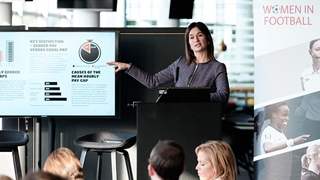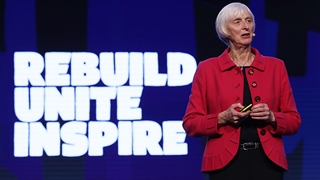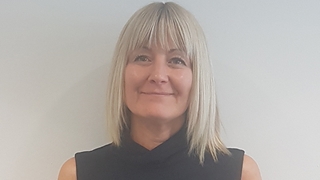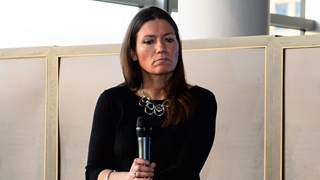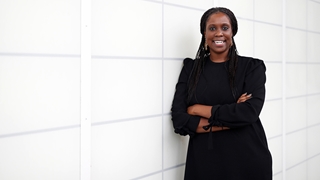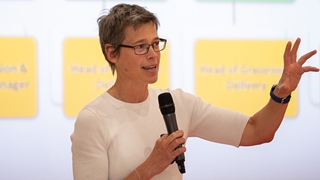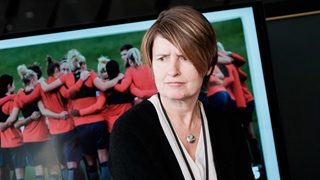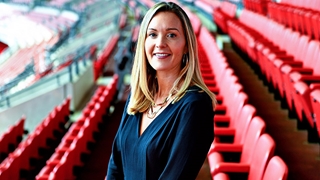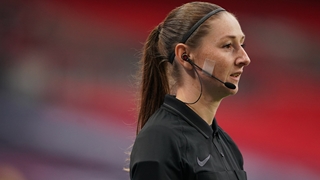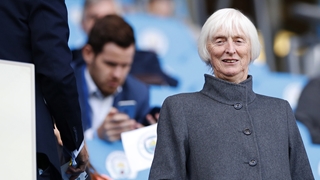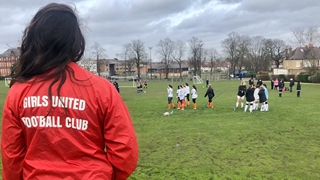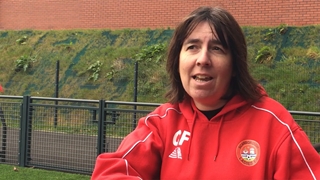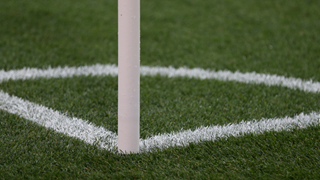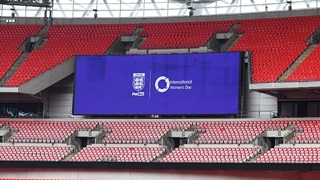
Rachel Brace - HR Director
Things have changed. When I first joined the FA’s SMT the women were definitely in the minority and now we make up more than half. But I don’t want you to think this is a numbers game for me – when we set about trying to make the FA more diverse in the broadest sense it was always about creating a more modern organisation, better representing society and the game we serve and knowing that in doing this we will simply be better at what we do.
International Women’s Day is a global day celebrating the achievements of women, while focusing on the continued fight for gender equality. Personally this translates into me being lucky enough to have more opportunities and support than my mum did while hoping that my daughter grows up with the confidence and support to know that she has the same chances and no more hurdles in life than her brother.
I am really proud to be part of the FA SMT today. Full of talented women who bring great professional expertise and of course character! But more than this we have great male allies on the team. In my career, I have been empowered by wonderful women and men equally along the way. We all need allies, our thinking and outlook is richer as a result and this team is no different.
Baroness Campbell CBE - Director of Women's Football
International Women’s Day is important to us here in the UK and around the world. There are women deprived of freedom, opportunity and basic human rights all across the globe. So as we celebrate the progress we are making we should never forget that there is still much to do here and elsewhere.
It seems so wrong that gender should determine your boundaries limiting what you can do, what your earn or how far you progress but that is the reality we face every day.
I was delighted to be asked to join the FA team five years ago and I'm very proud of the progress we've made by increasing the number of women playing, coaching and refereeing our national game. I believe football is the most powerful brand in sport and that used well, it can change the lives of girls and women in society. It can show what is possible and demonstrate that women can break barriers and achieve their dreams, whatever they are!
In my time at the FA, I've watched our commitment to diversity and equal opportunity grow and grow. We know we still have more to do but we are determined to continue to drive change so that football truly is ‘for all’ whether they work at the FA and they are involved in our game across England.
Louisa Fyans, Director of communications
I’ve been working in the sports industry for longer than I’d like to admit, and I’ve seen it evolve over time. Other than a few notable, talented exceptions who I greatly admire, women have for a long time been in the minority in the sports media and I’ve spent the majority of my career talking to male journalists.
But in the last five years or so, the rise of women’s football in particular has seen a new influx of talented female journalists which has been great to see – and they’re just as ruthless in pursuing a good story as their male counterparts! That’s a trajectory I’d like to see continue.
In an industry typically dominated by men, I've often been the only woman in the room over the course of my career, but I’m incredibly lucky that I have never felt anything other than respect. I feel fortunate that I've always been judged on my knowledge of the industry rather than my gender.
That should, of course, be a given but seeing the recent abuse on social media of female pundits across the sports industry, it’s clear that there’s still a long way to go. I hope that by using platforms like International Women’s Day to acknowledge and celebrate the achievements of women, we’re able to continue the momentum in pushing for gender equality both in our industry and in wider society.
I think I’ve always been hired because I’ve been the best person for the job – regardless of my gender – and I’ve always been given the freedom as a manager to recruit the people that are best for the roles available.
I’m proud to manage a team at the FA made up of brilliant men and women with different personalities and backgrounds, who complement and support each other. The same applies for our senior management team, which I joined in 2019. I take great pride that it has so many talented women on it, but we're all supported, respected and challenged every day by equally talented men. It’s by working together as equals and promoting that same culture internally that we are creating a more modern organisation which is better set up to serve the game we love.
Polly Handford - Director of legal and governance
I have worked in the legal and regulatory areas of sport for over ten years, first in rugby and then in football. Both have traditionally been seen as predominantly a game for boys and men. I've been asked over the years whether, being a woman in what may have in the past been described as being a man’s world, has brought challenge.
The answer to that is – at times, yes. However, I can honestly say that never before have I felt that being a woman in football and holding a senior position is as much of a positive experience as I do now. I suspect it's the first time in FA history that there's so much female representation on the senior management team and on the Board. There's more to do in terms of representation in some other areas of football, but huge progress has been and is still being made.
When you look at where women’s sport was ten years ago - whether that be rugby, cricket, football and many others - the progress and change on and off the field since then has been transformational.
In relation to football and the FA, we just need to look at the growth of grassroots girls’ and women’s football as well as professional women’s football with the Barclays FA WSL and Championship and the development and profile of the Lionesses, to see how much the whole game has to be proud of.
It's really important we celebrate such progress and success and when better to do that than on International Women’s Day?
Edleen John - International relations, corporate affairs and co-partner for equality, diversity and inclusion
As we celebrate International Women’s Day in 2021, I have to stop, reflect and give thanks for the ups and downs of the past 12 months and being in the lucky position of having my health, a home and a support network.
While this year has changed our perceptions of many aspects of society and the prioritisation of what is important in life, it also enabled me to open a new chapter in my life’s book. In September 2020, I had the honour of joining the FA's senior management team responsible for leading the ICA Division and Co-Partnering on the Equality, Diversity and Inclusion Agenda.
International Women’s Day is a moment of global reflection. We’re able to look back at how far we’ve come by seeing the progress that has been made on reaching increased societal equality, whilst also recognising that we still have a very long way to go. We know that each and every one of us has a role to play in that journey and men are an important ally in changing the structural and cultural barriers to equality within society and within football. The reality is that things are not moving as fast as we would like them to and we must recognise and acknowledge that it’s time for change.
While the drive towards gender equality is a daily focus for me inside and outside of work, International Women’s Day is an opportune chance to acknowledge and celebrate the fantastic women that impact and strive to change our world for the better. It’s a moment in time where we must reflect and be thankful for the teachers, supporters, mentors, coaches and sponsors that share their experience, lower down the ladder to help other women up, who provide a listening ear and who shatter the glass-ceiling and remove the barriers in a male-dominated world.
As a newer member of the SMT, I’ve been lucky to be surrounded by women like this within the team and am privileged to be playing this role for others in the organisation too.
For many years, football has been a male-dominated sport and so for me, International Women’s Day at the FA is about remembering the importance of never giving up the fight for equality so that we can truly make football for all. As it relates to gender, that means making sure that we strive to make sure that women and all gender identities are represented, respected, valued and included.
It means making football as accessible to all children. It means recognising the intersectional voices and experiences within different communities and catering to this. It means helping everyone to understand the benefits that different knowledge, talents, skills and insights bring to the table and the fact that many women come armed with a super-power of tackling problems differently. It means calling-out the old boys’ networks and explaining that there’s room at the table for us all.
We have to continue to provide a platform for women to equally participate and contribute to football and society in a way that works for them – and most importantly, in a way that is equally valued.
As a proud Black female, I know that I'm significantly under-represented across the landscape and even more under-represented when we look at those with decision-making power – be that in football or in society. I recognise that as a member of the FA’s SMT, I have a role and a responsibility to use my platform and voice to help drive change for everyone. I strive to think about how I can continue to pay forward the focus on this agenda, making sure that the number of change agents across clubs, leagues, counties and football-related stakeholders continues to grow.
On International Women’s Day, I congratulate many of the women in football and in broader society who are fearless, who are innovative, who challenge the status quo and who are willing to speak up for change because we still need you.
We want a game that is free from discrimination and a game that is welcoming and accessible to all, but that won’t happen without each of us playing our part. So let’s use this International Women’s Day to think about what one thing we can start to do differently to help us create a legacy for upcoming generations, where gender equality is the established norm and no longer the aspiration.
Lucy Pearson - Director of FA Education
IWD is an increasingly important moment in time, shining a light on and celebrating the influence and impact of women across the world while also reminding us that there's still a long way to go before there is gender equality in this country and globally.
The day reminds me of my pride in being female and of the active responsibility I have to move my world to being a place of gender equality; because at the moment, it simply isn’t. Too often, women settle for less than true equality and are grateful for there being ‘some improvement’.
We get caught up in the gratitude cycle for some room having been made, and satisfy ourselves that what we have is ‘good enough’ and aren’t we lucky that it’s not as bad as it used to be. Challenging the gratitude cycle is another habit that IWD reminds me to do.
The FA Strategy 2020-2024 places equality, diversity and inclusion at its heart. It calls out some of the glaring gender inequalities that exist and persist in football and indeed in sport more widely, such as girls not having the same access to football as boys.
As the game’s national governing body, we're wholly committed to balancing out these scales and while there are few quick fixes, plans are in place to change things. The very fact that the FA has committed itself to addressing this fundamental, historic inequality give us a strong springboard to effect true transformation.
I'm really fortunate to be part of the FA SMT and to work alongside female and male colleagues whose shared motivations are to improve the game for all and to use the power of football to contribute ever more usefully to society. The female voice always adds value to a debate and the balance of females (8) and males (7) on the SMT improves the quality of thinking and decision-making; it also means that the commitment to gender equality is never lost in a discussion.
We are never starting with a blank page; in pushing for equality, it requires a rebalancing of approach, opportunity and investment and this is challenging for everyone. But IWD reminds us that we cannot be content with anything less than true gender equality, and that to settle for some improvement is falling woefully short of where we need to be.
Kelly Simmons - Director of women's professional game
International Women’s Day is an important date in the calendar to celebrate the contributions of so many incredible women and the gains made for gender equality.
But it's also a time to reflect on what still needs to change to ensure all women across the world have access to education, health care, equal opportunities in employment and are free from gender-based violence.
In football, we have achieved so much – 50 per cent gender representation on our FA Board and senior management team, the profile of the Lionesses, a thriving professional women’s league and greater access to football for girls. And we have an ambitious new strategy to continue to grow the game at all levels and for all women and girls.
But I dream of a world where all girls can play football at school, our talent pathway represents our communities, women and girls make up 50 per cent of players, coaches, referees and senior executives across the industry and equal pay and equal prize funds are the norm. So until then, lets use IWD to celebrate the advancements but to reflect on what else we need to do to close the gender gap. Lets keep fighting!
Kathryn Swarbrick - Director of commercial and marketing
The theme of this year’s International Women’s Day is Choose to Challenge. When I first read this, it really made me smile, because as a rather lively, curious and admittedly stubborn child, I was often told by my teachers and my parents not to challenge their rules and authority.
So I absolutely LOVE the fact that IWD has moved on from reflecting on the achievements of great women, to putting out a bold and provocative “call to action” to challenge the precedents in order to drive progress.
I often recall a piece of content I saw about five years ago which brought to life the fact that the majority of gender stereotypes are established in children by the age of six. This is when the dreams and ambitions of our children can get closed down.
I find this such a depressing and frightening prospect. So to me the idea of choosing to challenge needs to be celebrated and encouraged amongst kids, in a bid to break down the barriers to what they believe they can achieve.
The work we at the FA are leading to ensure every girl gets equal access to football is a brilliant example of how we can help to change attitudes and ultimately attainment for the next generation, just by giving everyone an equal chance. This is the kind of work which gets me out of bed in the morning, and channels football as a real force for good.


